What if you could turn your expertise into a profitable online course by 2026? As online learning continues to soar, creators have an opportunity to profit from their skills.
With the global eLearning market projected to reach $457.8 billion by 2026, demand for high-quality online courses has never been greater.
Online course marketplaces offer ready-made solutions that simplify course creation, marketing, and monetization. These platforms also provide various tools for building interactive content, engaging students, and increasing sales.
But with so many online course marketplaces available, choosing the right one can be difficult.
That's why we're featuring the top 10 online course marketplaces in 2026 to help you launch and scale your business successfully.
What is an Online Course Marketplace
An Online Course Marketplace is an online place or website that includes information or resources about various online courses and connects teachers and students.
Through these platforms, instructors can design and offer classes on just about any topic. Students can buy, enroll in, and take these classes on their own terms.
Through such platforms, education now spans the globe and accommodates people from around the world.
Essential Statistics About Online Course Marketplaces
Recently, the online course market has experienced remarkable growth in user interaction and market reach. These statistics say it all:
Market Size And Growth
In 2022, the global e-learning market size was reported to be $399.3 billion, with expectations of achieving a Compound Annual Growth Rate (CAGR) of 14% from 2023 to 2032 with projections targeting $1 trillion by 2032.
Revenue in the Online education market is expected to reach $185.2 billion in 2024 then increase to $279.3 billion come 2029. (Statista)
User Engagement
125 million people used online courses in 2023, four million more than previously reported the year before.
The number of learners that connected with Massive Open Online Courses began from three hundred thousand in 2011. By the year 2021, the numbers climbed to about 22 million.
Revenue Generation
The revenue made by the online course app industry in 2023 stood at $3.1 billion. LinkedIn Learning is the best earner in the unsigned year alongside online course services.
Segment Performance
It is important to note that approximately $18 billion was generated by the Learning Management System (LMS), which shows that the market is very favorable.
Learn More: How To Build A Marketplace Website For Course Creators
Top 10 Online Course Marketplaces To Start Your Course Business
Educators can create, market, and sell their courses on online course marketplaces. These platforms make it easier to meet students' needs and generate revenue.
Listed below are the top 10 online course marketplaces where you can start a business:
1. EzyCourse
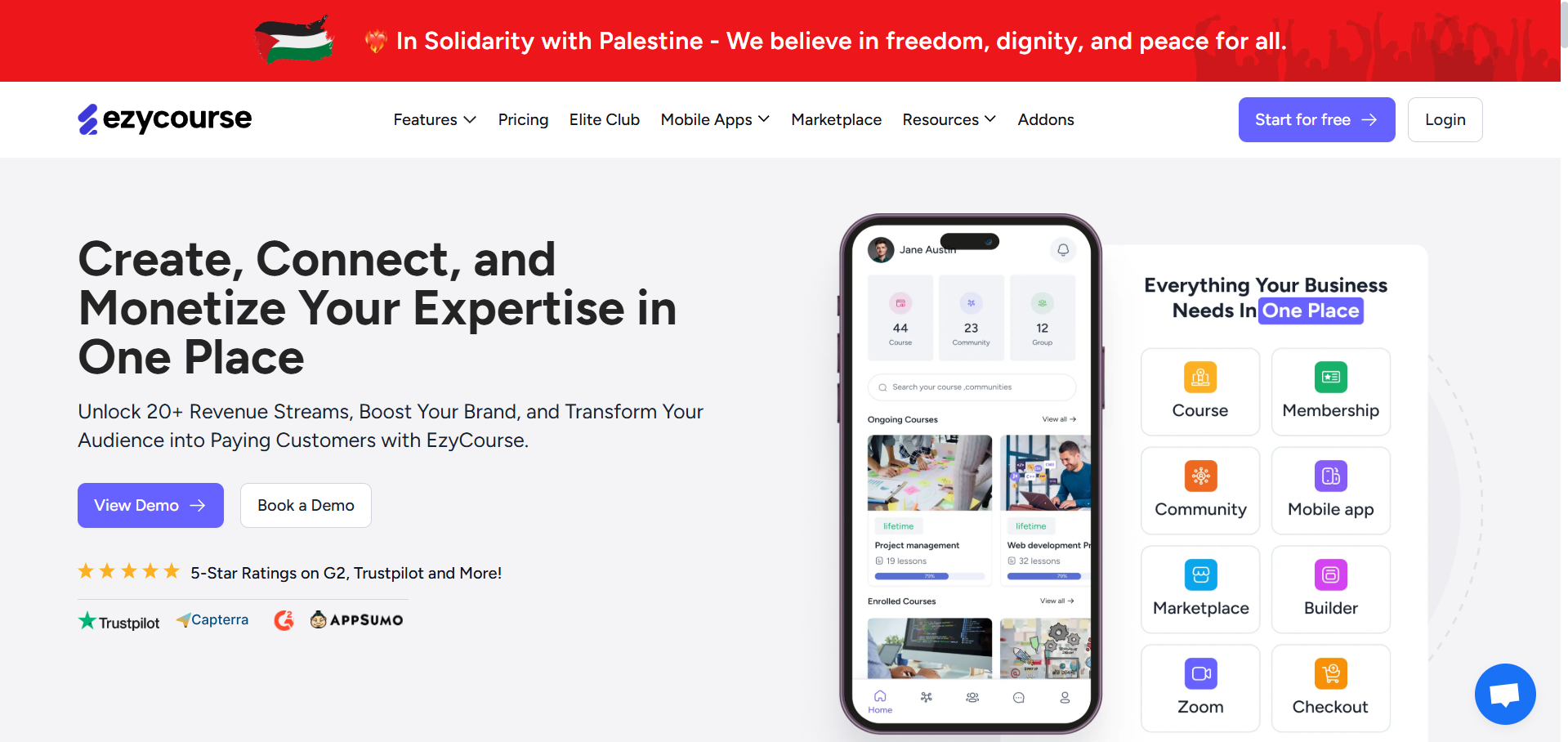
EzyCourse is a great online course marketplace designed for educators, trainers, and businesses to create and host their online course marketplaces.
Using EzyCourse’s Marketplace Add-on, you will get extensive control over seller settings, sales, and commissions to marketplace owners. Although it is primarily an online course platform, if you want to create a website like Udemy, you can do it with EzyCourse.
EzyCourse offers simple online learning and marketplace maintenance without lengthy manual setup or high operating expenses. The best thing about EzyCourse is its simple setup process, easy website creation, and payment processing, etc.
Also, EzyCourse includes a powerful set of tools for educators, including course analytics and live classes, and the app allows for branding customization. Plus, it offers a range of content formats, including interactive videos, quizzes, and homework assignments.
Features
Advanced editor to create and sell courses, memberships, and bundles with flexible pricing.
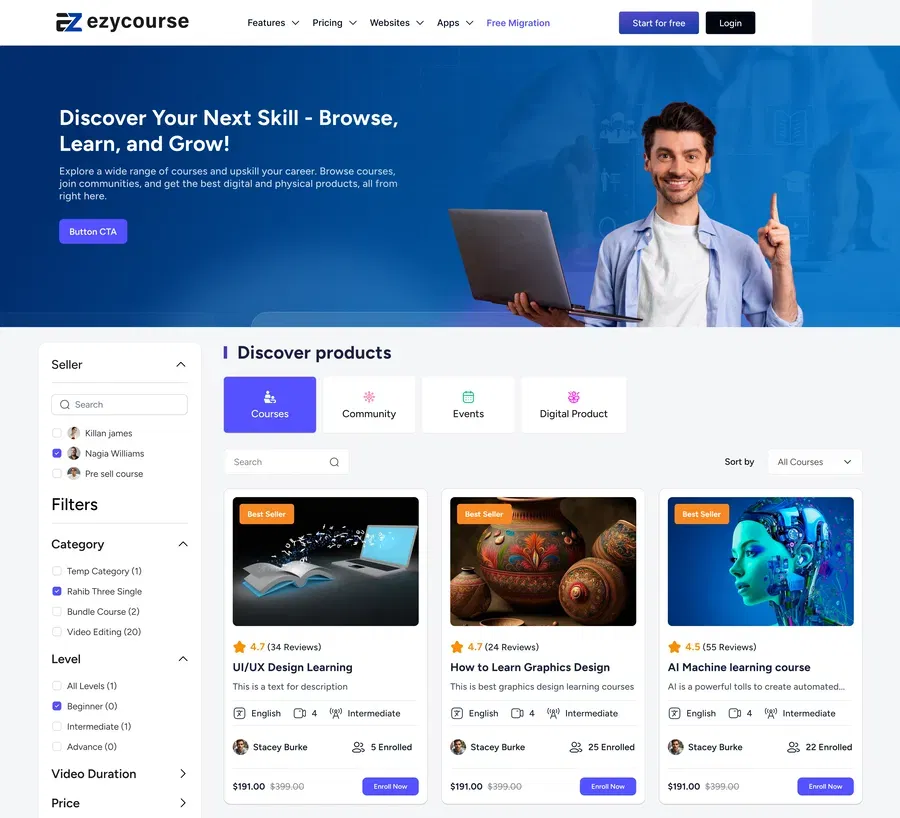
The editor supports content dripping, pre-selling, and multi-format delivery.
Marketplace add-on to build a full-featured course marketplace similar to Udemy.
Display the marketplace directly on your website using a widget.
Users can browse, filter listings, and view detailed seller profiles.
Manage sellers to approve or reject new sellers to maintain the quality of your marketplace
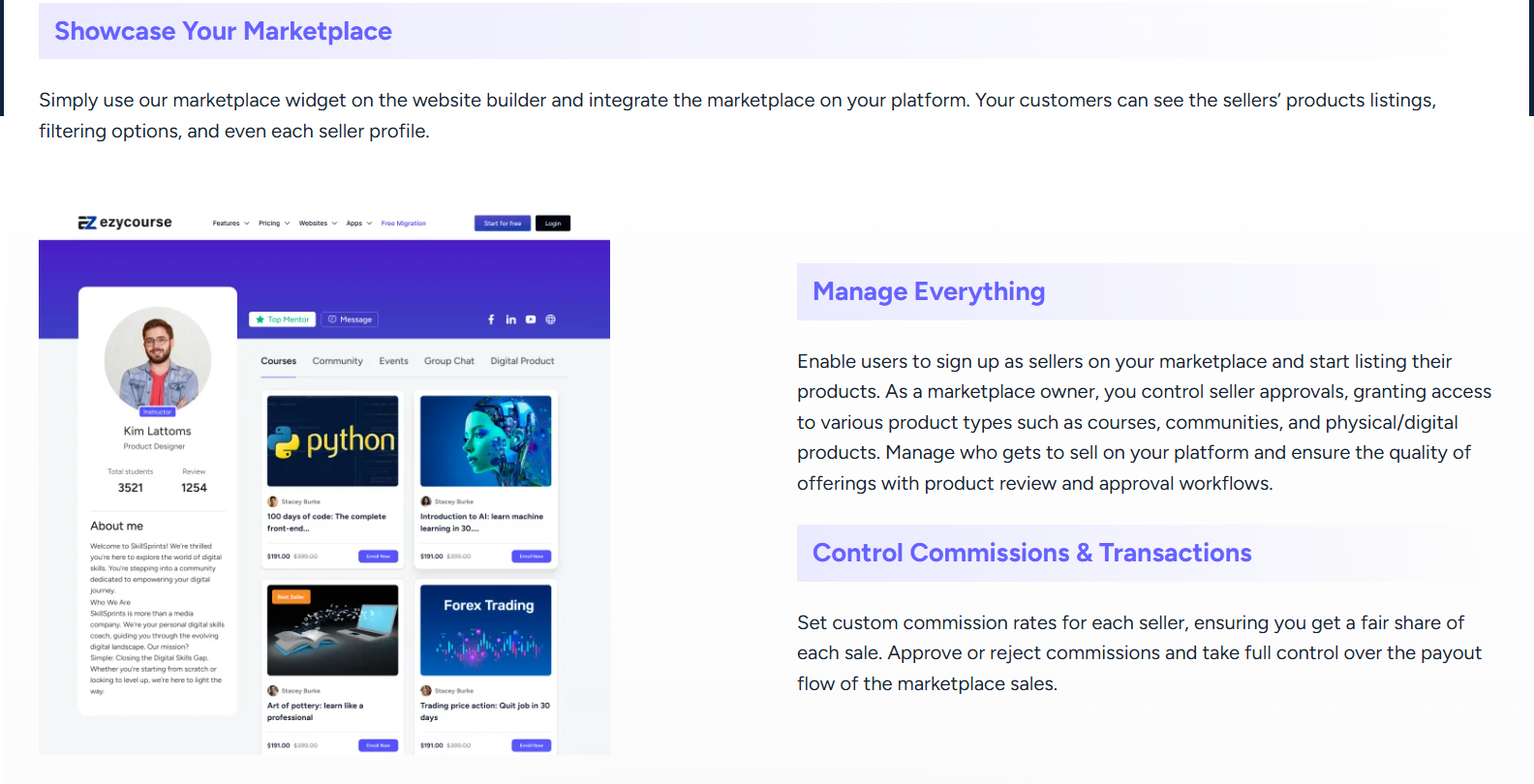
Set custom commission rates for each seller.
Each seller receives a dedicated dashboard to manage products, track sales, and receive updates on actions like approvals and payments.
Create a Facebook-like community feed for private discussions between instructors and students, enhancing engagement and communication.
Integrated payment systems ensure smooth transactions.
Each user and instructor has a detailed profile page that can act as a personal landing page.
Pricing Plans

Essential Plan
Price: $59/month
Best for: Personal creators
Features: Unlimited courses, custom pages, 2 communities, 5 channels per community, drip courses, and more.
Pro Plan
Price: $139/month
Best for: Professional creators
Features: Everything in the Essential plan + 5 communities, Zoom premium, advanced analytics, dynamic grading, and more.
Unlimited Plan
Price: $199/month
Best for: Large businesses
Features: Everything in the Pro plan + unlimited admin accounts, communities, live streaming minutes, VIP support, and more.
Elite Plan
Price: $299/month
Best for Businesses
Features: All unlimited features, 500,000 marketing emails, 50,000 live streaming minutes, VIP customer support, and more.
Marketplace Add-On Pricing:
Lifetime Deal: $1406 (one-time payment)
Monthly: $94/month
Yearly: $87/month
Note: Prices may change. Visit the pricing page for the latest updates.
Pros
No need for expensive custom marketplace development
Custom commission rates per seller
Easy to add the marketplace widget to your website
Affordable pricing options for creators with limited budgets
Intuitive seller dashboard for product and sales management
Scalable pricing tiers based on seller count
Approval workflows ensure high-quality content
Full control over transactions and commission payouts
Real-time notifications for sellers
Easily scalable without complex setup
Low platform fee of just 3.5% on sales after activating the marketplace add-on
Cons
No free plan
Only 40 sellers included for free; additional sellers require paid packages
You can run a full-featured, professional marketplace on EzyCourse for under $200 per month. If you have a larger budget and want long-term savings, consider the lifetime deal to eliminate recurring fees entirely.

2. Udemy
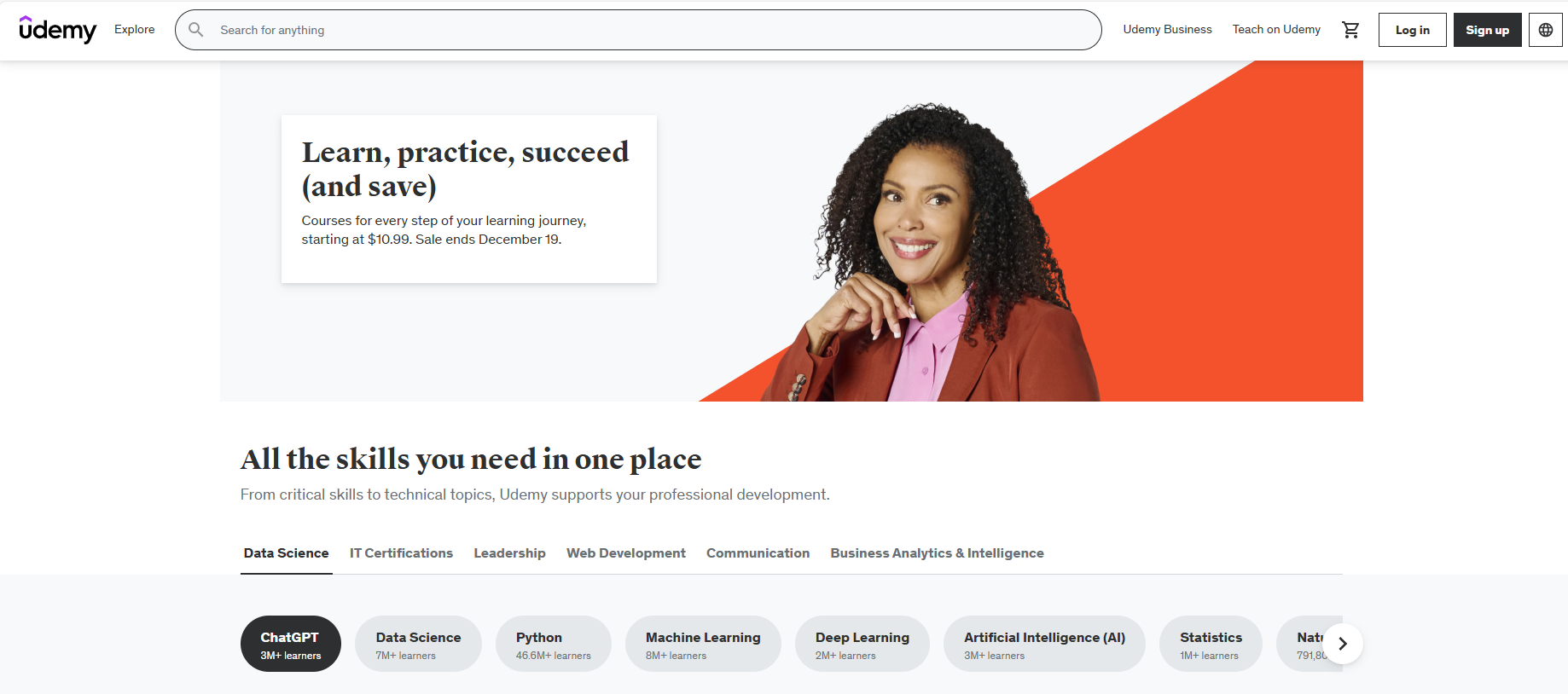
One of the best online venues focused on education is Udemy, which offers a wide variety of courses. Founded in 2010, Udemy has been steadily growing and now hosts a library of over 250,000 courses for over 73 million students across the globe.
It offers its users an opportunity to design and market their courses while the students can have quality and economical education in more than 75 languages.
Operating in over 180 countries, Udemy is now regarded as one of the leading online educational resources.
Learn More: How to Build Online Course Marketplaces Like Udemy
Key Features
Easy-to-use tools for creating multimedia courses with videos, quizzes, and assignments.
Intuitive and clean design for easy navigation by both instructors and students.
Udemy handles all payments, supporting multiple currencies and payment methods.
Built-in marketing features, including discounts and promotions to help instructors grow their courses.
Detailed data to track course performance, student engagement, and revenue.
iOS and Android apps for students to learn on the go.
Forums for instructors and students to share knowledge, ask questions, and engage.
Many courses offer certificates of completion, which can be added to professional profiles.
Pricing Plans For Udemy
Personal Plan (For Individuals)
Starting at $11.00/month
Billed monthly or annually, cancel anytime.Team Plan (For teams of 2 to 20 people)
$30.00/month per user
Billed annually; cancel anytime.Enterprise Plan (For organizations of 20+ people)
Contact sales for pricing.
Pros
Global reach, allowing instructors to access a worldwide audience
Flexible learning, enabling students to learn at their own pace
Diverse course offerings across a wide range of subjects
Cost-effective, with many affordable courses and frequent discounts
Scalability for instructors to reach thousands of students without physical classrooms
Enhanced engagement through interactive content such as quizzes and assignments
Continuous updates, allowing instructors to keep courses current and relevant
Cons
High competition with thousands of courses available, making it difficult to stand out
Revenue sharing, as Udemy takes a percentage of the course sales
Quality control issues, with some courses varying in quality due to limited oversight
Limited control over branding and course presentation
Dependence on Udemy’s platform policies, which can limit pricing flexibility and course content
Lower profit margins due to frequent discounts and platform fees
3. Skillshare

Skillshare is a creative & design-focused online community that provides an opportunity to learn in the fields of illustration, design, photography, video, etc.
As a learning platform, it offers courses on different aspects of creativity, making it suitable for both learners and instructors.
It is also very popular due to its subscription pricing. So that students can take numerous classes and interact with teachers and other students via talks and projects.
Because it’s so easy to use and there are so many low-cost options. It provides busy, professional creators with great learning opportunities.
Key Features
Course creation tools with video lessons and class projects
User-friendly interface for easy navigation
Subscription model for unlimited access to courses
Community engagement through discussions and projects
Mobile accessibility with iOS and Android apps
Project-based learning to apply skills hands-on
Exclusive Skillshare Originals from industry leaders
Team plans for businesses to provide learning to employees
Pricing Plan
Teaching on Skillshare:
Free Courses: Anyone can upload free courses to the platform.
Monetization: To earn revenue, your course must be selected for the premium catalog.
Revenue Share: Teachers receive 30% of the revenue generated from watch time on their premium courses.
Pros
Focus on creative skills ideal for artists and designers
Affordable subscription with unlimited course access
Flexible learning at your own pace
High-quality content from industry professionals
Active community for collaboration and networking
Regular course updates for fresh content
Accessible on multiple devices, including mobile
Opportunity for personal projects to enhance learning
Exclusive content available only to Skillshare members
Ability to learn from a wide range of creative fields
Cons
Limited advanced or specialized courses compared to other platforms
Subscription model may not be ideal for occasional learners
Course quality may vary due to open instructor availability
Primarily offers courses in English, limiting non-English speakers
No formal accreditation or certification for most courses
May not cover non-creative topics as extensively
4. Teachable

Teachable is an online course platform for creators, coaches, and educators that allows them to offer, grow, and scale their courses.
It is very simple to create a course with features suited to beginners and advanced business professionals. Using Teachable, one could develop personal brands and manage a large business with digital content creation tools and business processes.
Using this platform, one can earn money by sharing knowledge and expanding their business. It has a wide variety of options to suit various needs.
Key Features:
Easy drag-and-drop course builder for content upload
Customizable branding for courses and website
Built-in payment tools with fraud protection and flexible options
Marketing tools include affiliate programs, referrals, and email automation
Integrations with tools like Google Analytics, MailChimp, and Zapier
AI tools to assist with content creation and course development
Interactive features like quizzes, certificates, and student comments
Detailed analytics to track performance, sales, and engagement
Pricing Plan:
Basic Plan – $39/month (billed annually): Includes 5 products, 5% transaction fee, email marketing, community features, and custom domains.
Pro Plan – $119/month (billed annually): Includes 50 products, no transaction fees, affiliate marketing, live chat support, and public API access.
Pro+ Plan – $199/month (billed annually): Includes 200 products, 0% transaction fees, custom user roles, and advanced features.
Enterprise Plan – Custom pricing: Offers premium support, migration assistance, and dedicated success management.
Pros:
Flexible pricing and subscription options.
Built-in payment gateway with fraud protection.
Customizable course pages and branding.
Access to advanced marketing and affiliate tools.
Seamless integrations with popular third-party apps.
AI tools for fast content creation and course management.
Provides scalable solutions for businesses and solopreneurs.
Detailed analytics for tracking business performance.
Student engagement features to foster a community and enhance learning.
Cons:
Transaction fees for lower-tier plans.
The free plan has limited features compared to paid plans.
Limited support for live chat on lower plans.
Some advanced features are locked behind higher-tier plans.
Not ideal for highly specialized or niche courses.
Custom domains available only in higher-tier plans.
5. Podia
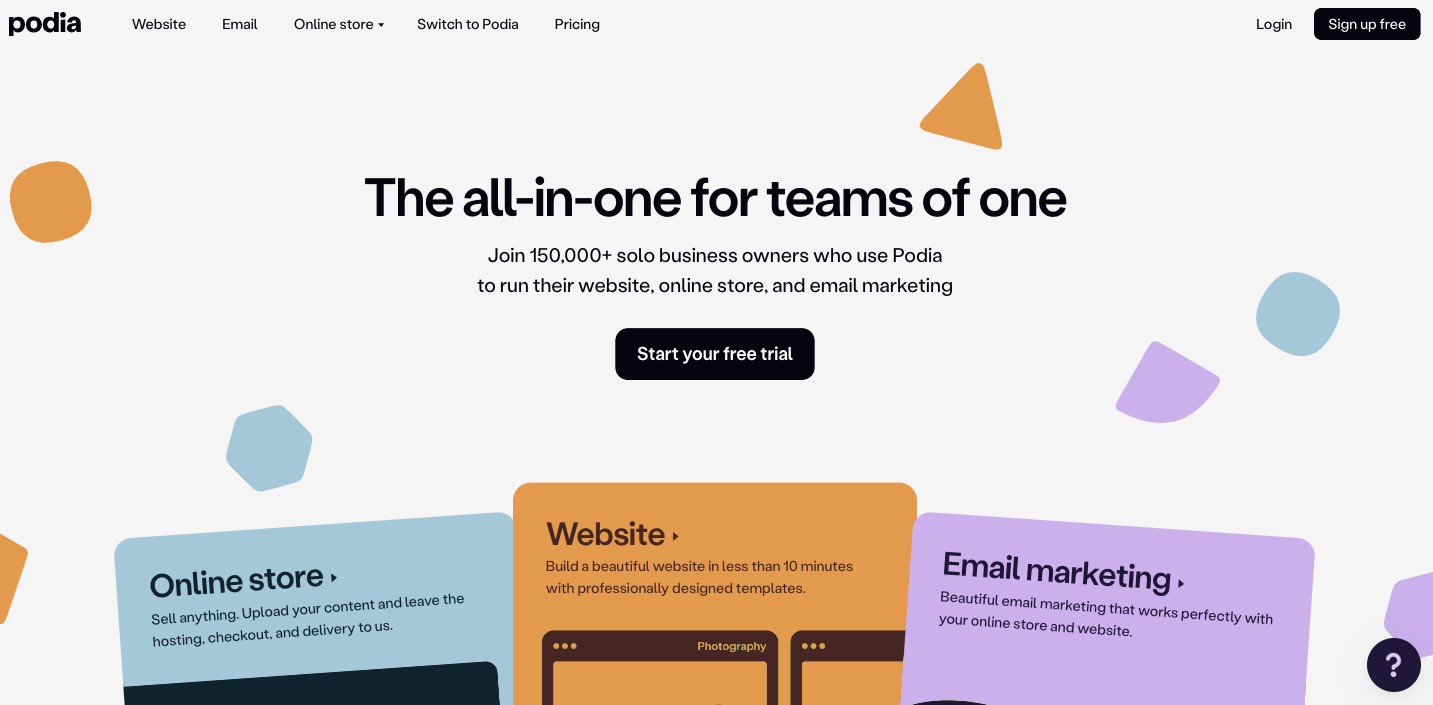
Podia is an online course platform where you can design, market and sell your courses, memberships and other tools. With its simple interface, Podia is perfect for any creator at any level. Also, it has all the features tutors and students need in one place, making it easy for them to communicate.
Features:
Create and organize courses easily with lessons, videos, quizzes, and more.
Design your course site with templates that match your brand. Looks professional and cohesive.
Accept payments globally with multiple payment options and currencies.
Track student progress and engagement with built-in tools to offer support where needed.
Use email marketing, sales pages, and pre-sale options to promote your courses.
Add quizzes to your courses and give certificates when students finish.
Set up an affiliate program so others can sell your courses for a commission.
Students can learn on the go by accessing courses on their mobile devices.
Pricing Plan:
Mover Plan:
$39/month ($33/month with yearly billing)
5% transaction fees
Shaker Plan:
$89/month ($75/month with yearly billing)
No transaction fees
Pros:
User-friendly course builder that requires no coding skills.
Customizable templates for a personalized branding experience.
Integrated payment processing for easy global transactions.
Comprehensive student management and tracking tools.
Robust marketing tools, including email campaigns and sales pages.
Quizzes and certificates to increase student engagement.
Affiliate marketing features to grow your sales network.
Mobile-friendly for flexible learning on any device.
Detailed analytics to track performance and student behavior.
Responsive customer support to assist creators.
Cons:
Transaction fees are applied on lower-tier plans.
Limited customization options on basic plans.
There is no free plan available.
New users may experience a learning curve with the platform.
The platform lacks community features for engagement.
Advanced features come at a higher cost with premium plans.
6. Kajabi
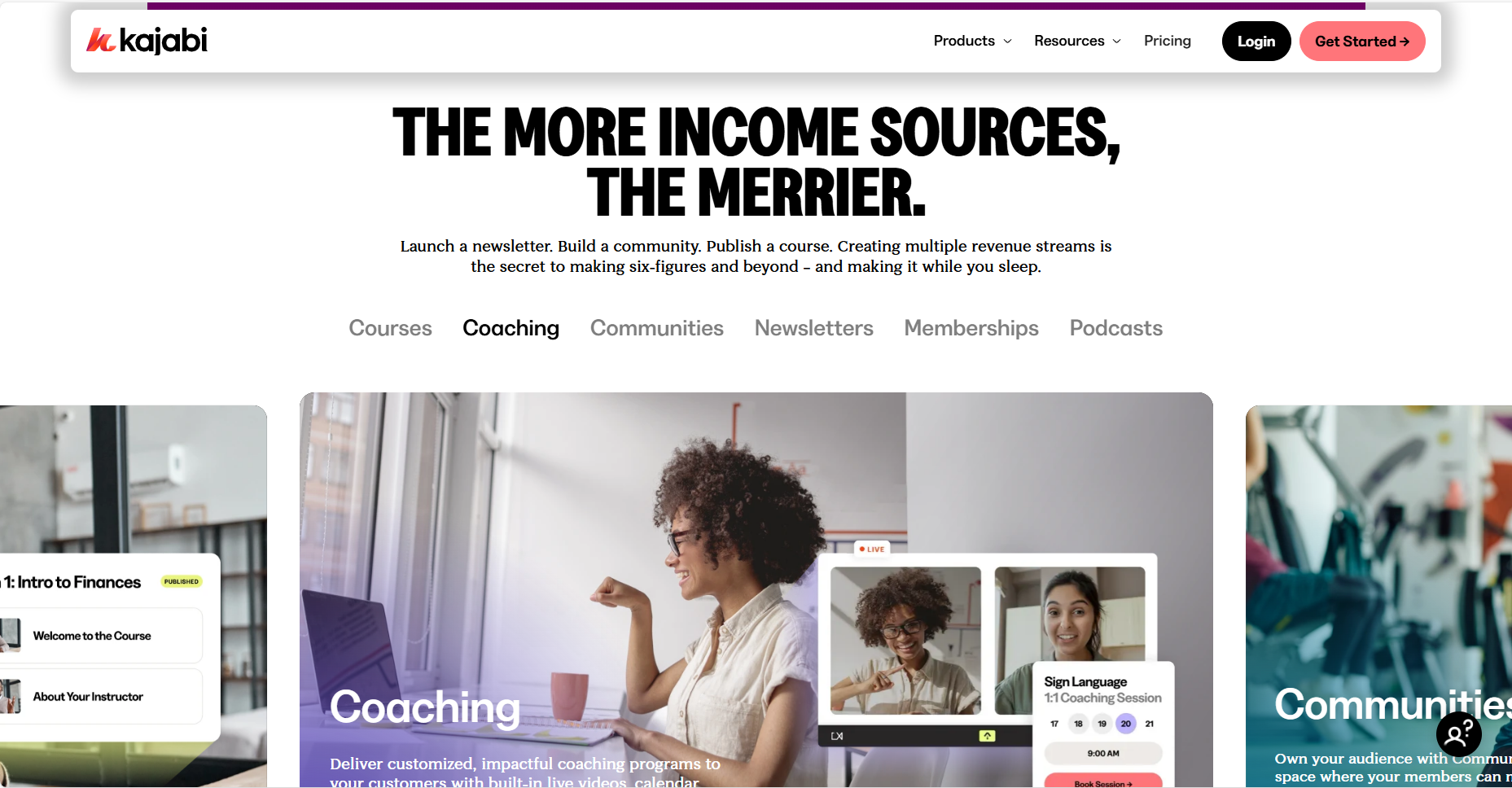
With Kajabi, creators can create, market, and sell online courses, coaching, memberships, and other digital products. It has easy integrations for website creation, payment processing, and marketing tools.
It allows users to grow their revenue and business quickly. In fact, there are no transaction fees, so creators keep full control over their content and profits.
However, Kajabi provides customizable templates, marketing funnels, and customer management tools that make it the ideal solution for creating online businesses in 2026.
Features:
Easily create and sell polished courses with customizable templates and tools.
Host live video coaching sessions, track progress, and integrate calendars for seamless scheduling.
Build a community space for your audience to engage, connect, and grow with you.
Offer subscription-based access to exclusive content for recurring revenue.
Launch and monetize podcasts with ease.
Set up a fully integrated, no-code website to represent your brand.
Securely manage checkout and payments with industry-leading features.
Offer a custom-branded mobile app for your business, providing access on the go.
Pricing Plan
Growth Plan (Most Popular)
$159/month (billed annually) or $199/month (monthly)
0% transaction fees
Unlimited landing pages & marketing emails
15 products & 15 funnels
25,000 contacts & 10,000 active customers
1 website
Kickstarter Plan
$71/month (billed annually) or $89/month (monthly)
0% transaction fees
50 landing pages & 1,250 marketing emails
Basic Plan
$119/month (billed annually) or $149/month (monthly)
0% transaction fees
Unlimited landing pages & marketing emails
3 products & 3 funnels
10,000 contacts & 1,000 active customers
1 website
Pro Plan
$319/month (billed annually) or $399/month (monthly)
0% transaction fees
Unlimited landing pages & marketing emails
100 products & 100 funnels
100,000 contacts & 20,000 active customers
3 websites
Pros:
No transaction fees
Easy-to-use interface
Multiple revenue streams
Powerful marketing tools
Customizable design options
Unlimited landing pages
Excellent customer support
Scalable features
Kajabi mobile app
Full ownership of content
Cons:
High pricing for beginners
Limited integrations with third-party tools
Steep learning curve for new users
Limited email marketing features on lower plans
Transaction fees for lower-tier plans
Limited templates for certain features
7. Mighty Networks
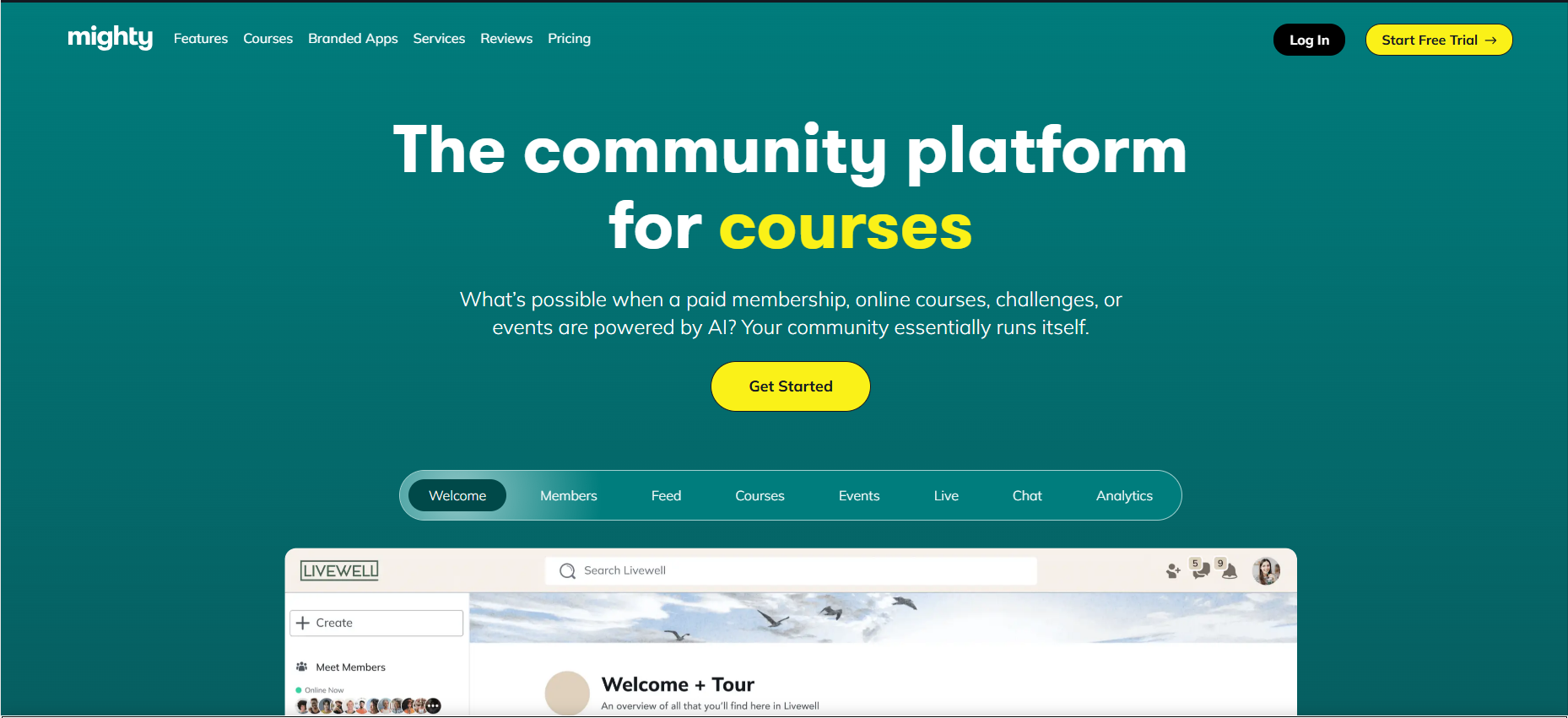
Mighty Networks is designed for creators to sell their online communities, courses and memberships. It enables entrepreneurs to connect with their audience through events, challenges, and courses while the AI does the rest.
Users can subscribe or pay per payment for their communities while the platform integrates branding, content, and payments.
Also, Mighty Networks makes scaling easier with mobile applications, analytics, and effective collaboration tools.
As a result, it's ideal for creators who want to expand their businesses while maintaining control over their content.
Features:
Create and manage online communities with ease.
Build and sell courses, challenges, and events.
Integration of AI-powered People Magic to foster member interaction.
Ability to offer paid memberships and subscription models.
Custom branding options for a personalized experience.
Mobile apps for iOS and Android to access community on the go.
Advanced automation tools for streamlined operations.
Detailed analytics to track user engagement and growth.
Pricing Plans:
Community Plan: $41/month (billed annually)
Courses Plan: $99/month (billed annually)
Business Plan: $179/month (billed annually)
Path-to-Pro Plan: $360/month (billed annually)
Pros:
Easy-to-use interface for creators.
AI-driven tools for better member engagement.
Flexible monetization options (subscriptions, one-time payments).
Ability to create and manage events.
Scalable features as your community grows.
Custom branding and white-label options.
Integration with external tools for streamlined business management.
Mobile apps to connect members anywhere.
24/7 support to assist users.
Free trial available for new users.
Cons:
Pricing can be high for beginners.
Limited third-party integrations.
Advanced features are locked behind higher-priced plans.
Some users report a steep learning curve.
Mobile app customization can be limited.
Limited features on lower-tier plans.
8. Simplero
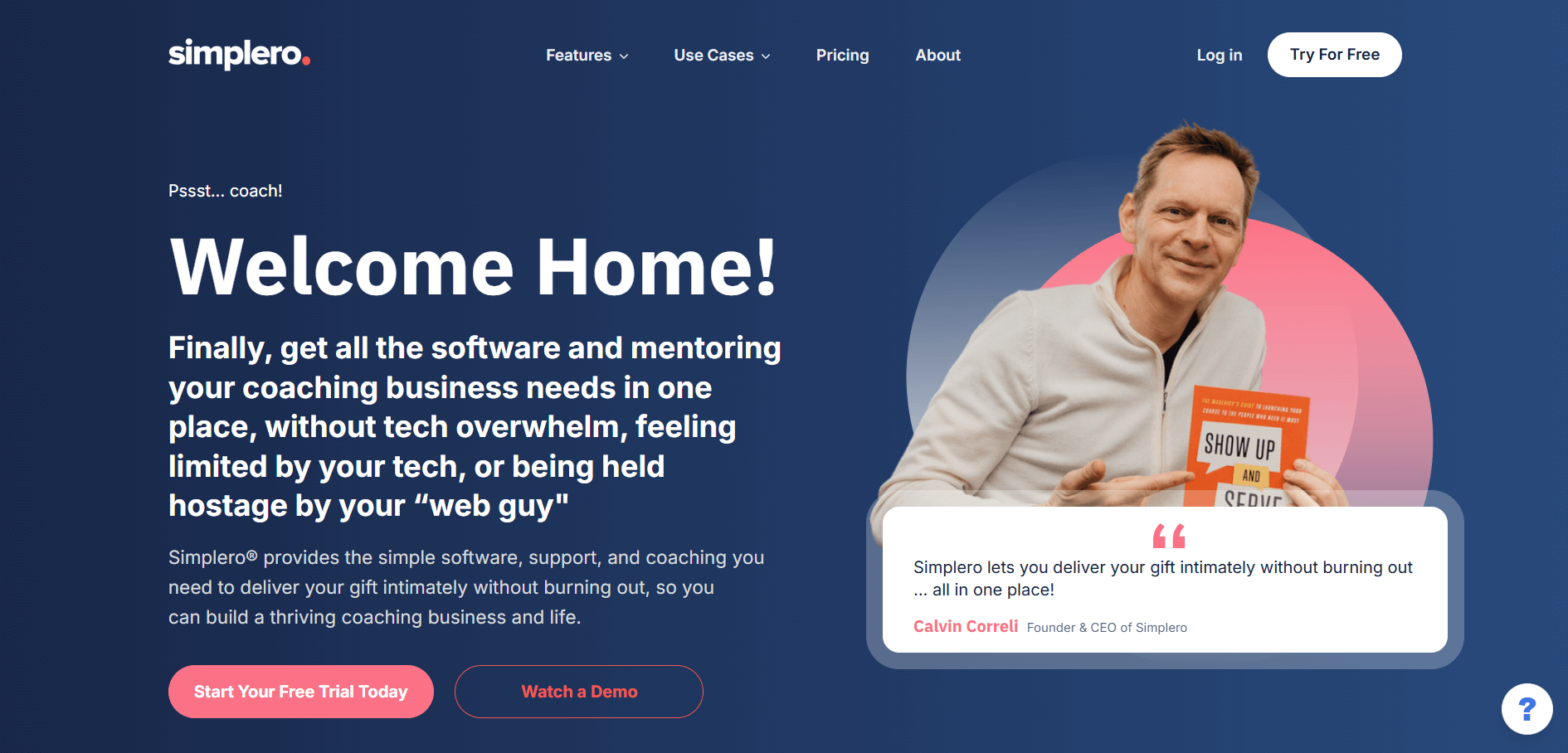
Coaches and educators who want to manage their courses using one platform will definitely appreciate Simplero.
The system provides tools for growth, engagement, and efficiency through email automation, websites, payment management, and community management.
They can create customized client pathways, gather customer insights, and build funnels all in one place, preventing relocation to another platform. Simper also supports high ticket sales and masterminds while providing additional services for the clients.
Features:
Website builder with unlimited pages.
Landing page creation with advanced split testing.
Affiliate program management.
Email marketing and automation.
Customizable payment systems and subscriptions.
Course creation and community building tools.
Advanced customer insights and segmentation.
Done-for-you campaigns and global scalability.
Pricing Plan:
Starter: $59/month (billed annually)
Scale: $149/month (billed annually)
Skyrocket: $249/month (billed annually)
Pros:
Centralizes multiple business tools into one platform.
Powerful automation for customer journeys.
No tech expertise required to build and manage sites.
Great customer support with personalized assistance.
Flexible pricing plans for various business stages.
Scalable for small to large businesses.
Strong community-building capabilities.
High-quality course creation tools.
AI-powered features like transcriptions and enhanced search.
0% transaction fees for collecting payments.
Cons:
Can be overwhelming for complete beginners.
Pricing can be high for smaller businesses.
Limited to certain customizations without developer support.
Some advanced features may require a learning curve.
Limited integrations with third-party tools.
The platform may feel feature-rich for simpler needs.
9. LearnWorlds
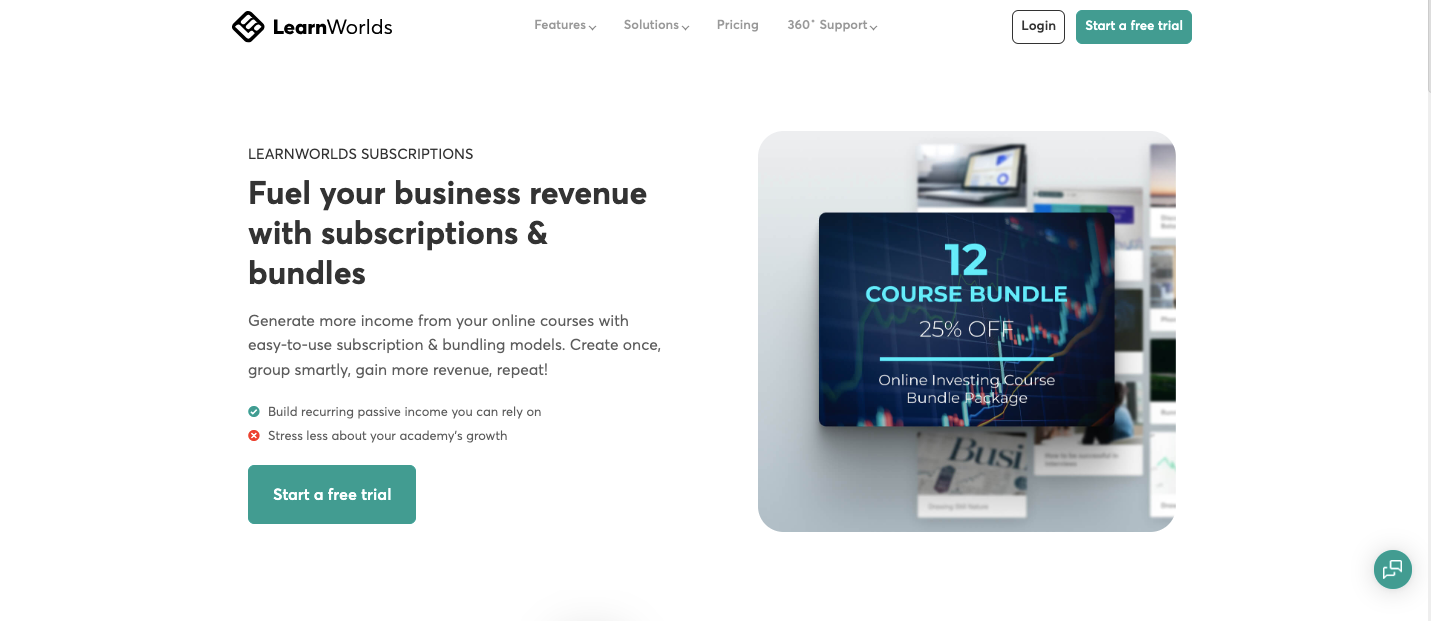
LearnWorlds is an AI-powered LMS that provides everything you need to start and scale your online course business in 2026.
It offers a comprehensive platform with tools for creating, marketing, and selling digital products.
Also, it enables course creators to build beautiful, customizable websites, engage learners with interactive content, and streamline sales processes through advanced pricing and marketing features.
LearnWorlds also offers mobile app integration, automation, and support to help scale your business.
Features:
Create interactive courses with videos, quizzes, and assessments.
Highly customizable course design with drag-and-drop builder.
Advanced sales and marketing tools like funnels and upselling.
Seamless mobile app integration for iOS and Android.
Automation tools for user management and marketing.
Built-in affiliate marketing options to boost sales.
24/7 customer support and an extensive help center.
Scalable plans with white-label options for branding.
Pricing Plans:
Starter: $29/month (includes core features, 3-page website, and 3 payment gateways).
Pro Trainer: $99/month (includes everything in Starter, plus unlimited courses, live classes, and
mobile apps).
Learning Center: $299/month (includes advanced features like interactive videos, Zoom integration, and more).
Pros:
Easy-to-use interface for course creation.
Engaging, interactive content options.
High level of customization and branding.
Mobile app for on-the-go learning.
Advanced marketing funnels and sales tools.
Extensive integrations with third-party tools.
Powerful automation features.
Great customer support with 24/7 assistance.
Comprehensive training and resources available.
Scalable for all business sizes, from startups to large enterprises.
Cons:
Pricing may be high for small businesses.
Limited free plan with restrictions.
Learning curve for advanced features.
Limited third-party integrations for some platforms.
Transaction fees on certain plans.
No built-in email templates for advanced campaigns.
10. Thinkific
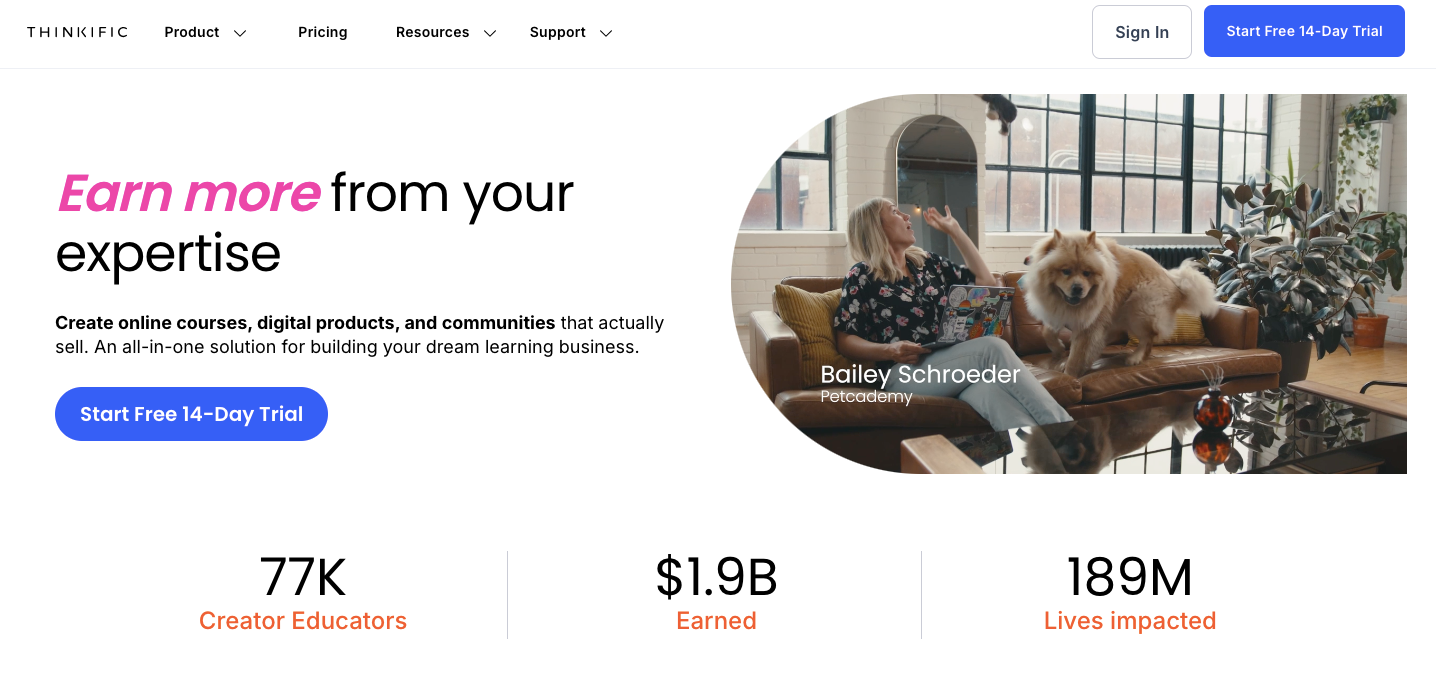
In the online education space, Thinkific is one of the best platforms dedicated to online course development and sale.
They provide a multitude of tools to make it easier when creating online courses, coaching sessions, and webinars.
Moreover, with the integration of AI tools, Thinkific seems to be a game-changer for creators as it brings ease to the promotion and creation processes for its users.
The company has priced its products in a way that is affordable for brands of all types, both small and large.
Features:
AI-powered course creation tools to speed up content development.
Full control over your business with payment processing and Thinkific Payments.
Multiple digital product options including courses, coaching, and webinars.
Group orders and advanced sales features for increased revenue.
Customizable landing pages and AI-optimized marketing tools.
Enhanced email marketing tools with automated flows and list-building options.
Branded mobile app to engage students on-the-go.
24/7 customer support and access to community-driven knowledge.
Pricing Plans:
Free: $0/month - 1 course, 1 community, 1 digital download, and basic features.
Basic: $36/month - Includes unlimited courses, 1 community, and essential tools.
Start: $74/month - Includes additional features like assignments, bundles, and live lessons.
Grow: $149/month - Advanced tools for growing businesses with features like analytics and API access.
Pros:
User-friendly, no tech expertise required.
AI-powered tools for faster course creation.
Multiple product options to monetize expertise.
Comprehensive marketing tools to boost sales.
Custom branding and mobile app options.
Access to a global distribution network like Spotify.
Full ownership of content.
Robust integrations with e-commerce platforms.
Free resources, including Thinkific Academy and support.
Scalable pricing to suit growing businesses.
Cons:
Some advanced features may require higher-tier plans.
The Free plan is limited to one course and one community.
Limited customization for lower-tier plans.
Mobile app branding and features are add-ons.
Pricing can be high for creators just starting.
Limited third-party integrations for some features.
Features Of Online Course Marketplaces
Online course marketplaces offer a variety of features that enable creators to monetize their content, reach a wider audience, and manage their courses and sales.
Development Of User-Friendly Interfaces
A simple and straightforward design is what makes the best platforms easy for both instructors and learners. This means that, regardless of the technical level of a user, one can create, enroll or manage courses easily.
Payment Process
Online courses an platforms include payment gateways like PayPal, stripe and other credit card payment processors. This helps students make easy payments while instructors receive their payments without struggle.
Course Creation Redesigning Tools
Interactive tools are incorporated into these platforms to help teachers develop courses even if they are not technical. The resources include videos, photographs, quizzes about the lessons, and assignments.
Marketing And Promoting Courses
These platforms also provide different marketing tools including native email marketing, discounts, promotions, affiliates, and SEO optimizations. As a result, instructors are able to sell their courses even more effectively.
Mobile Accessibility
Both mobile applications and websites always enable learners to log into their courses at their own pace, offering various learning opportunities. This is particularly useful to busy working adults who want to learn as they commute.
Community Forums
Many of the platforms include bulletin boards where students can seek clarifications post materials, or interact with other students.
In turn, this promotes a sense of 'community' and facilitates open communication between all members.
Certification And Accreditation
Most platforms allow teachers to upload certificates that students can use to prove their newly acquired knowledge after completing a course. These courses are also offered on platforms recognized by relevant industries.

Advantages & Disadvantages Of Online Courses Marketplaces
As we all know, online marketplaces allow teachers to create and sell courses to students worldwide. They offer ease of access, wide reach, and growth opportunities.
However, they also have some advantages and disadvantages for both course creators and learners.
Benefits Of Online Courses Marketplaces
Global Availability
Online education platforms have no restrictions. Teachers can connect with students from different parts of the globe, enlarging their market share considerably.
Flexible Study Hours
Courses can also be undertaken on a part-time basis, allowing students to integrate learning with other activities such as work or family life.
Varied Courses
A lot of the course offerings on these websites also include other areas including business, computer technology, and art among many others. Learners can access specialized content according to their preferences.
High Cost-Efficiency
All online courses are cheaper than conventional school-based education. Thus any other costs that come with traveling, books and so on are removed. For some of the sites, courses are absolutely free too.
Instructor's Business Expansion
Instructors need not incur additional operational costs as they are already there. After production of a course, this can be marketed to the maximum number of learners without further costs.
Improved Student Interaction
Such platforms have various multimedia like videos and gamified content which leads to active course participation. As a result, students are more likely to complete the course and stay engaged.
Disadvantages Of Online Course Marketplaces
High Competition
It is quite a challenge to get noticed with too many instructors presenting their work. Active marketing and appealing content attract students.
Revenue Sharing With The Platform
A significant proportion of the course fee is taken by most platforms thereby making instructor income less than expected. Depending on the platform, this income share can reach up to 50%.
Quality Control Issues
Not every course featured on these platforms has high standards. The lack of supervision allows him to create and publish courses with low-quality and poorly conceived content.
Limited Control Over Branding
Teachers' branding features are relatively limited and that too may hinder their plans to build their own brand.
Dependence On Platform Policies
Course authors and teachers are bound by the platform's rules; they are limited in their pricing, content, and revenue splits. A teacher may suffer a reduction in income or the visibility of the course if these rules are modified.

Dreaming of Building Your Own Online Course Marketplace?
That wraps up our blog on the top online course marketplaces for course creators. Among all the platforms discussed, EzyCourse stands out by offering the best of both worlds—it functions as a course platform like Kajabi, Thinkific, or LearnWorlds and also as a course marketplace like Udemy or Skillshare.
So, if you're looking to build your own marketplace website, EzyCourse is like an all-in-one combo pack that gives you the flexibility and features to grow with ease.
Ready to start your online course marketplace with EzyCourse?





![How to Build a Custom LMS for Your Online Course Business? [A Complete Guide]](/_next/image?url=https%3A%2F%2Fezycourse.b-cdn.net%2F2422%2Fcmk0q991m685g8s9nef5o4yt0.png&w=1920&q=75)
